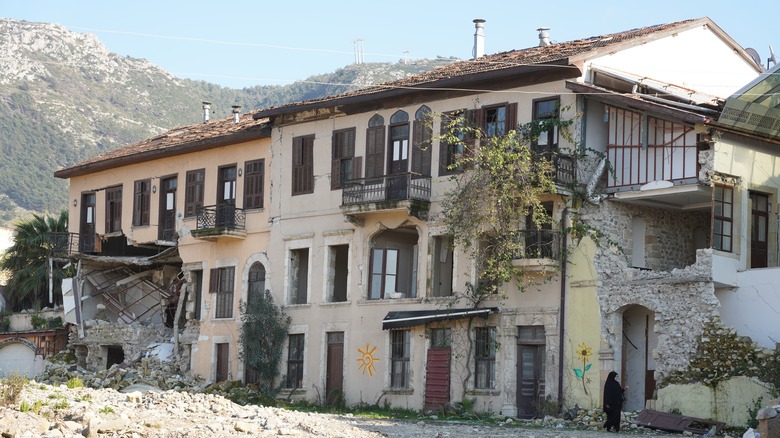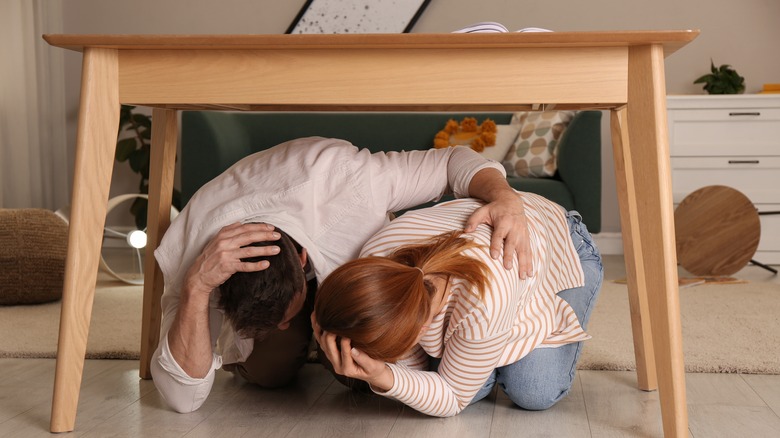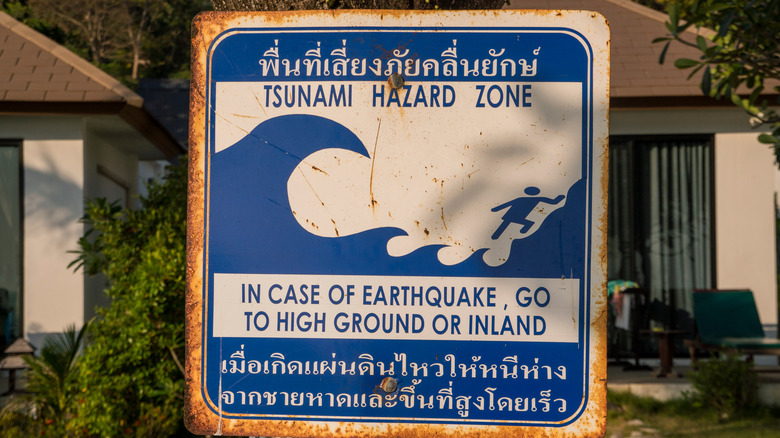The Best Thing To Do If There's An Earthquake While You're On Vacation
It's very disconcerting to experience an earthquake, even when it's small. Some may just cause your light fixture to swing, but larger ones can crack pavement, damage buildings, and, in some cases, cause a devastating tsunami. If one hits when you're on vacation, it's important to know what to do and what not to do. First, stay calm. We know that's a big ask, but knowing the right steps to take before you experience this situation can keep you from panicking. One of the most important things you can do is have an emergency meeting plan if you get separated from friends and family. When you arrive at your destination, pick a spot to meet up if you can't communicate.
Your plan should include letting people know where you'll be. If you're in another country, program the number for your embassy into your phone, as well as the emergency numbers for the country. (The U.S. Department of State has a list of them in other countries here.) Email copies of all your travel documents to yourself in a password-protected folder, or put them in a phone photo album so you don't have to get to the hotel safe. If an earthquake occurs, only use the phone to make actual calls if you must. Text your family and friends instead of calling to keep emergency phone lines open. It's also worth checking to see if your travel insurance policy covers a situation like this if you have it.
What to do if you're inside during an earthquake
You may know many hotel safety tips, but an earthquake is not a typical situation most travelers are prepared for. When you arrive at your hotel, look at the evacuation plan and locate the nearest staircase since you shouldn't use the elevator. Place a robe and shoes near the bed (in case glass breaks), and keep your phone nearby and charged. If you're in bed, turn face down and cover your head/neck with a pillow and don't move until the shaking stops. However, if there is a large fixture or mirror above you, move away from it.
When the shaking starts, locate a sturdy piece of furniture like a desk or table (not a doorway), go under it, and cover your head and neck with your arms. If you're in a wheelchair or walker with a seat, lock the wheels and stay put, covering your head and neck. Stay away from windows and unstable furniture. If you're in a rental home, get out of the kitchen. Don't light a match or a lighter as gas lines may leak.
After the shaking stops, stay inside unless the building is damaged. If it is, leave by the stairs. If you're trapped, don't yell. Bang on a wall or pipe, or text from where you are. Cover your mouth so you don't breathe in anything harmful. Outside, stay away from power lines and buildings – glass can travel when it breaks out of windows – and prepare for aftershocks (smaller earthquakes) that can happen after the main one.
What to do in an earthquake a car or a tsunami zone
If you're in a car during an earthquake, pull over to the side of the road and stop, though not under power lines or anything that could fall on you, and avoid bridges and overpasses. Engage the parking break. When the shaking stops, if the road is broken or has debris like fallen rocks, proceed with caution. If there is a broken power line near you, don't get out. Call emergency services immediately and put your hands on your lap. Don't touch metal surfaces, such as seatbelts buckles, as they conduct electricity.
If you're in a place prone to tsunamis, get to higher ground immediately. This is especially important if you're on a beach. Know the signs of a tsunami and don't wait for a siren or warning. The earthquake itself can be a sign. You may hear a loud roar or see water either rising quickly, forming a large wall of water, or receding faster than usual (sometimes leaving fish behind). It could be all or just one of these signs. While not all earthquakes will cause tsunamis, it's better to act as though it will. Don't touch the floodwater as it can contain toxins or chemicals from leaks. Earthquakes can't be predicted, but what you do have control over is how you prepare for them. If you're traveling to a place that experiences regular earthquakes, knowing these rules can help keep you safer.


